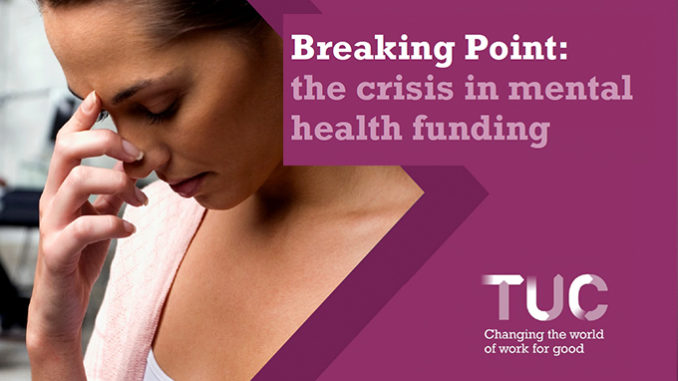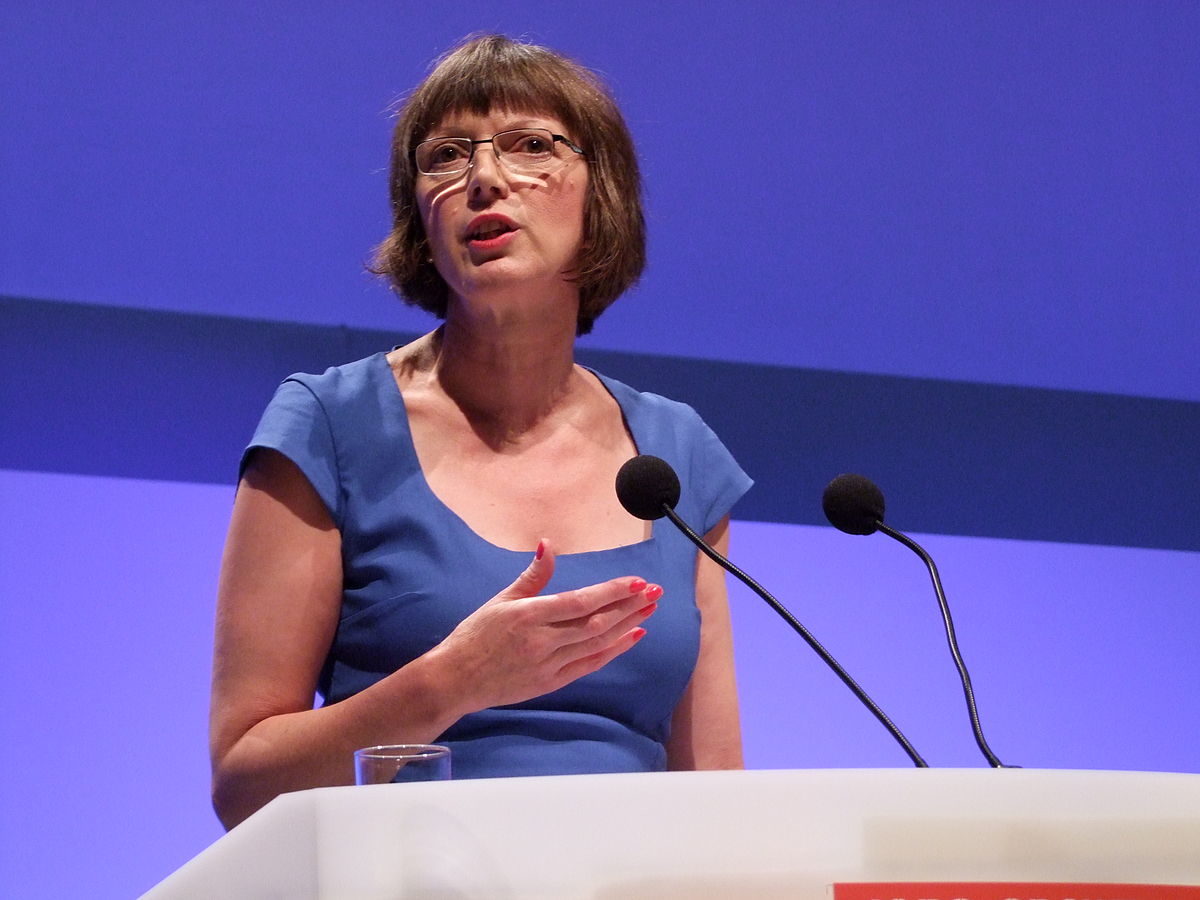
Keep Our NHS Public welcomes the damning report on mental health from the TUC on the devastating effects of Conservative Party austerity policies over the last nine years, which has seen three quarters of people suffering mental health issues going without treatment. This must be a launch pad for a nationwide campaign.
Mental health is a major issue for the NHS. This new TUC report sets out the ways in which cuts to the NHS specifically and society-wide austerity has had an overwhelmingly negative impact on the mental health of the nation and has led to shocking failure to provide the desperately needed services to help. The report highlights that as well as systematic underfunding of the NHS as a whole, other factors must be taken into account including low staffing levels, access to services for younger people, poor provision of perinatal health services, failing drug, alcohol detoxification services and a lack of beds for mental health (and much of what there is costing a fortune to private sector).
The document opens with a strong condemnation of this Government’s ongoing policies which are at the heart of the crisis. Frances O’Grady, General Secretary Trades Union Congress (TUC), says,
In the decade since the financial crash, day to day spending on running our public services as a share of GDP has been slashed to its lowest level since the late 1930s. Successive Conservative-led governments have pursued a self-defeating policy of austerity that has hampered our economic recovery and left large parts of our essential public services at breaking point.

This sort of contextualising is too often missing from the mainstream narrative around the NHS and must be central to our demands about the mental health crisis. The report goes on to say:
To fully understand the crisis in mental health, we need to acknowledge the impact that austerity has had across our public services and the challenges that this poses for developing a systemic, cross-public sector approach to address the mental health needs of our communities.
With support in the form of advice and research from many of our own campaigners and activists, including allies in Health Campaigns Together and the NHS Support Federation, this report then goes on to outline the reasons for the crisis in the NHS on this issue and what must be done to meet it.
For all of us campaigning for the NHS, this must now become a key front of activity in safeguarding the wellbeing of staff and patients – and in the process, highlighting the reasons why the NHS is not safe in this Government’s hands.
Mental health in the UK is a very real and growing problem. The Government’s policies have done a great deal to aggravate the issue and, as we’ve already covered in detail on this site, its response has been woeful and hollow.
The crisis in mental health is particularly bad for children and women. The number of referrals to specialist children’s mental health services has increased by 26 per cent over the last five years, while the number of under-18s admitted to A&E for self-harm has increased by 50 per cent in five years. Less than 25% of young people in need of care get it. And what is the new Government target? That two-thirds continue to be denied treatment. The target is that 33% of children in need of mental health treatment will be receiving it by 2020! And there is more: cuts to perinatal services have also had a damaging effect, as the reports explains, proving that NHS campaigning is not only for an end to health inequalities but is clearly a feminist issue too.
Alcohol and drugs misuse support services are also desperately underfunded as has been highlighted recently by Labour’s Shadow Secretary for Health Jonathan Ashworth.
All this and more has aggravated a crisis situation which this timely report evidences powerfully. One of its key strengths is the inclusion of testimonials of health care workers themselves. For example, a cognitive behavioural therapy (CBT) Nurse Psychotherapist from Yorkshire says in the report:
Staff teams are stretched to breaking point in mental health and referral rates are increasing whilst NHS and third sector resources are dwindling dramatically. Patients’ needs are more complex now than ever before and more time and space is needed to meet these safely and effectively. Buildings are being sold off to private buyers leaving fewer and fewer community bases and services are being re-designated to suit the estate provision not the needs of the population. I have feelings of despair and fear for the future.
The roots of the problem are wide-reaching, coming from poor support for mental health in schools and from local authorities, more stress at work and so on. But it is the deliberate cuts to these services and to the NHS by this Government which are always at the heart of the problem.
The following are some key findings which should become a vital piece of ammunition in any health campaigners toolkit;
- In 2013 there was 1 mental health doctor for every 186 patients accessing services. In 2018 this has fallen to 1 for every 253 patients.
- In 2013 there was 1 mental health nurse for every 29 of patients accessing services. In 2018 that has fallen to 1 for every 39 patients.
- There has been a 30% reduction in the number of beds available in mental health trusts since 2009.
- The number of beds for mental health patients in England has slumped by nearly 3,000 (-13%) since 2013.
- One in six (17 per cent) of the English population aged between 16 and 64 met the criteria for common mental health disorders in 2014.
- People with severe and prolonged mental illness die on average 15 to 20 years earlier than other people but only around a quarter of those with a common mental health condition are in treatment.
- While the total amount of income received by mental health trusts in England has risen since 2016–17, once inflation is taken into account it becomes clear that they actually received £105 million less than in 2011–12.6
- Between June 2017 and May 2018, 23,686 mental health staff left the NHS, equivalent to an eighth of the total workforce in mental health. By the end of June 2018, one in ten mental health positions were unfilled, and net recruitment of mental health nurses is getting worse.
- A recent survey of staff working in mental health services shows that more than two in five staff (42 per cent) said they had been on the receiving end of violent attacks in the last year.
Impact on NHS staff
The current crisis is also having a detrimental effect on the mental health of NHS staff who work in the area, the report says:
Underfunding in mental health services, together with fewer available staff to deal with an increasing number of users, has put huge pressure on the workforce and left mental health trusts struggling to staff services safely. This is having a negative effect on patients who use these services and on the health and safety of the staff who provide them.
This means that we need to link up our campaigns with patients and workers, campaigners and trade unionists (in other services areas such as the education sector, as well as health) and to reach deep into people’s communities on this vital issue. Keep Our NHS Public therefore wholeheartedly agrees with Frances O’Grady when she goes on to say:
We need a whole system approach to the mental health crisis. And this can only come with meaningful and sustainable investment in the NHS, adult social care, local authorities and public health and in our schools and colleges.
The report makes some key demands:
- That NHS England upholds its commitment to mental health parity by 2020.
- Real terms funding increases across the public sector to address the significant cuts to resources since 2010.
- A 5% funding increase across the NHS.
- Proper investment in schools that will reverse the 8 per cent cuts to pupil funding seen since 2010.
- A fair and sustainable funding settlement for local government that addresses the £5.8bn funding gap identified by the Local Government Association, including a £3.5bn funding gap in social care by 2025.
- More should be done to encourage employer support for effective workplace interventions around workplace stress and improvements made to working conditions.
Keep Our NHS Public supports these demands and in addition we will strive for:
- A government that is committed to safeguarding a free universal health care service that is publicly owned and publicly run.
- A nationwide campaign to highlight these issues and help achieve the kind of health and care services we want.
Look out for more details on the nationwide campaign on mental health coming soon.
In the mean time why not join Keep Our NHS Public today:
Keep Our NHS Public is the longest running national campaign fighting to save our NHS. You can find our more about us here. By joining us you’ll become part of a community of health campaigners with unparalleled experience and passion, will belong to a nationwide network of activists and have the support of a core team of experienced organisers at a national level. It’s easy and doesn’t cost the earth.
Join Keep Our NHS Public today!


Leave a Reply